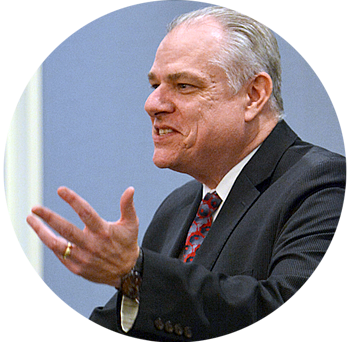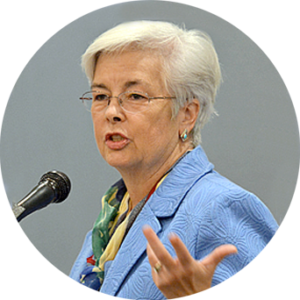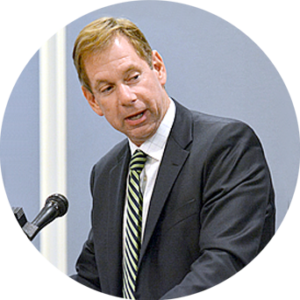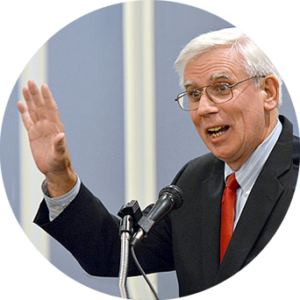By Sophie Cannon and Jesse Goodman, Bulletin Staff
‘The world of journalism is changing … sharing intelligent stories with intelligent readers is a hard feat. Thanks for refusing to give in and for fighting the good fight.’
— Edward Achorn, Vice president/editorial pages,
Providence (R.I.) Journal

The journalists honored at the 56th Annual Yankee Quill Awards ceremony Oct. 6 sounded a common theme of change and progress and reminisced about an older era of journalists. They also acknowledged the responsibilities journalists have to upholding the profession in the 21st century and beyond.
The acceptance speeches mentioned too the pressure journalists face in reporting news in spite of resistance from politicians and the government, and touched on the future of journalism in a digital age.
Five Yankee Quill Awards were presented, one posthumously.
The recipients were Sarah Josepha Hale, a 19th century poet, writer and magazine editor from Newport, N.H,; Edward Achorn, vice president/editorial pages, The Providence (R.I.) Journal; Maura Casey, editorial writer at The Hartford (Conn.) Courant and The New York Times, Lincoln R McKie Jr., former publisher of the Revere, Mass.-based Journal Transcript Newspapers, former executive editor of The Sun of Lowell, Mass., and former managing editor of the Telegram & Gazette of Worcester, Mass.; and Brian McGrory, editor of The Boston Globe.
They are now fellows of The Academy of New England Journalists, which presents the Yankee Quill Awards annually through the auspices of the New England Society of News Editors. The award is considered to be the highest individual honor awarded by fellow journalists in the region. Selection for the award is not based on any single achievement but rather on the broad influence for good during the course of a career.
Achorn spoke in his acceptance speech first about the past and then about the future. He attributed some of his success and drive to his late father, Robert C. Achorn, former editor and publisher of the Telegram & Gazette and a Yankee Quill Award recipient too,
Edward Achorn was a Pulitzer Prize finalist in 2003 and is an avid baseball fan, with two books published on the subject.
Achorn recalled how he fought for legislation to close a loophole in Rhode Island law that allowed sex for cash indoors, and how he faced a backlash not only from politicians who did not agree, but from other publications.
Discussing that experience, Achorn said: “There is only one way to look at a politician — down.”
Achorn also has been with The Eagle-Tribune of North Andover, Mass., and the then-Middlesex News of Framingham, Mass, He has won multiple awards and helped the Eagle-Tribune win a Pulitzer Prize in 1988 by contributing to its coverage of a failed furlough program under Massachusetts’ then-governor, Michael Dukakis.
After reflecting on the past, Achorn spoke about the future of journalism.
“We all know the world of journalism has changed from its heyday,” Achorn said.
But he said there is still a bright future ahead as newspapers shift to more multimedia approaches.
“The world of journalism is changing … sharing intelligent stories with intelligent readers is a hard feat,” Achorn said. “Thanks for refusing to give in and for fighting the good fight.”
Casey, like Achorn, has been honored multiple times for her newspaper work, including at the Eagle-Tribune. Casey was a member of the staff of the Eagle-Tribune that won a Pulitzer Prize in 1998 for general news reporting. She also has won the Scripps Howard Walker Stone Award for editorial writing. Casey was chairwoman of the foreign journalist exchange program for the New England Society of News Editors. She organized four conferences between New England journalists and Russian editors.
Casey also touched on a generational theme in her acceptance speech. She attributed her major successes to those who have stood by her.
“Your friends and family reveal who you are. If that’s true, then I’m amazing,” Casey joked.
Casey reflected on the past by saying that “over the last three generations of journalism, I think about the laughs I’ve had.”
Also like Achorn, Casey recalled a parent in her life. Casey spoke about her mother, who died of heart disease when Casey was just 20 years old. Remembering her mother’s advice to her, Casey challenged the audience with a question.
“She would ask one question: ‘Have we tried to make our world a better place?’ I think we have,” Casey said.
In McKie’s acceptance speech, he attributed much of the achievements in his career that led to his receiving the Yankee Quill Award to his family, friends and newspaper colleagues, some of whom attended the awards dinner.
“I hope they all know how much they mean to me,” he said.
After thanking a number of people, McKie spoke about his wishes and his hopes.
“I wish that I had been less patient and more aggressive as a reporter, and I had focused more on watchdog and investigative journalism and reporting. It is what we do best and what we never do and can’t do enough of, especially as our governments increasingly hijack our information – our information – and our access to how our government operates,” McKie said. “I also wish I had been less impatient and more tolerant as an editor and manager … ”
McKie said that one of his hopes was “that I left the newsrooms where I worked, and more importantly the people in them, better off than” when he started.
Besides his work at Journal Transcript Newspapers, the Sun of Lowell, Mass., and the Telegram & Gazette, McKie was honored for teaching and mentoring journalism students at Northeastern University and as publication manager of the New England Newspaper and Press Association news website, the Bulletin.
McGrory was Introduced as being honored for his outstanding work as editor of the Boston Globe, McGrory was compared to the late Tom Winship, also editor of the Globe and a Yankee Quill Award winner, in the sense that McGrory’s legacy too will live on at the Globe.
McGrory first spoke of his love for Boston and the memories he has made there, wanting to “live nowhere else and work nowhere else.”
“The only place I ever wanted to work was at the Boston Globe,” he said.
McGrory then discussed the importance of journalism in speaking the truth and doing it well for generations to come.
“We are the ultimate arbiters of what is right and what is fact. We are in a moment here filled with excitement, and we have the burden and the privilege to change our industry. I look forward to what’s to come,” McGrory said.
The Globe won a Pulitzer Prize while McGrory was editor for its coverage of the Boston Marathon bombings in 2013. McGrory also won a Scripps-Howard award for commentary and the Sigma Delta Chi award for general column writing in 2011.
Discussing how the past meets the present, McGrory said that “way back then (we) were just preparing for the era we’re in now.”
“We have the burden, but also the privilege, to change the industry,” he said.
Sarah Josepha Hale was honored posthumously for her work dating to 1827, when she became the editor of Ladies Magazine, a magazine based in Boston for American women. She was a champion of the abolitionist movement and one of the founding members of Vassar College. Hale also is famous for writing the nursery rhyme “Mary Had a Little Lamb,” and recognized for her strong belief in equal rights for African-Americans.
In accepting the award on Hale’s behalf, Soline Holmes, Hale’s great-great-great granddaughter spoke about generations of powerful women and the need for change-makers in our society.
“I had to think back on the changes Sarah herself made, and how to embrace change, and realize that change is a good thing because a lot of us women might not be in this room today without somebody like Sarah Hale,” Holmes said.
About 85 people attended the awards dinner and ceremony in the Crowne Plaza hotel in Natick, Mass.

‘(O)ver the last three generations of journalism, I think about the laughs I’ve had.’
– Maura Casey, Editorial writer
Hartford (Conn.) Courant, New York Times

‘We are the ultimate arbiters of what is right and what is fact. We are in a moment here filled with excitement, and we have the burden and the privilege to change our industry. I look forward to what’s to come.’
–Brian McGrory, Editor
Boston Globe

‘I wish that I had been less patient and more aggressive as a reporter, and I had focused more on watchdog and investigative journalism and reporting. It is what we do best and what we never do and can’t do enough of, especially as our governments increasingly hijack our information — our information — and our access to how our government operates.’
–Lincoln R. McKie Jr., Journalism teacher and
former publisher and executive editor
